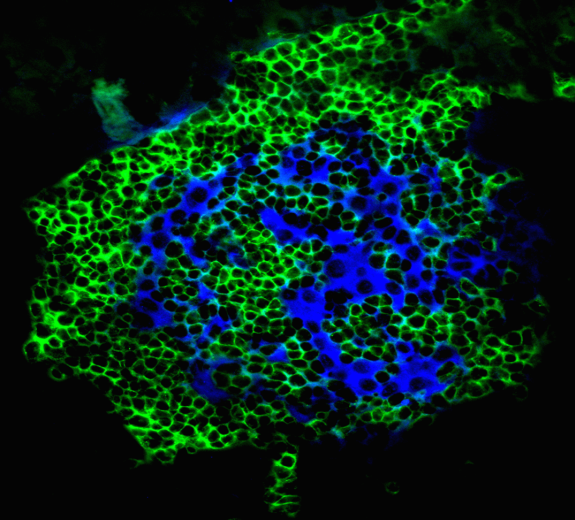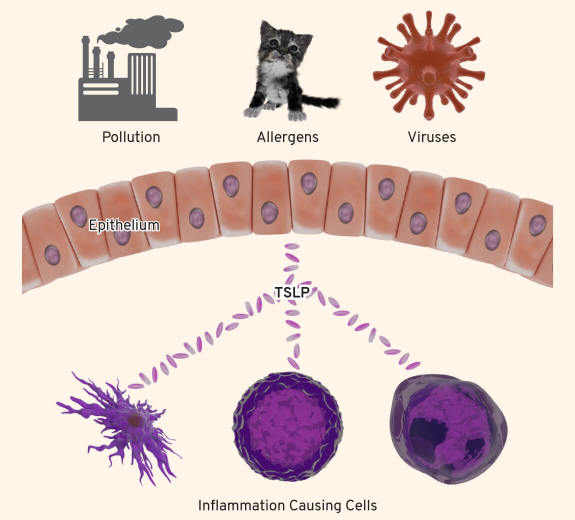It’s the 1990s in Seattle. Grunge music is getting national play. Amazon operates out of a garage. And a mysterious protein catches the eye of Steve Ziegler, PhD.
“It was early in the biotech world, at a time when factors that helped mature immune cells were of interest,” Dr. Ziegler says. “But we didn’t even have a name for it. We called it ‘Farr Factor’ after Dr. Andy Farr who first identified the activity.”
Dr. Ziegler wanted to learn more about the role this protein plays in the immune system. He worked with other scientists to clone its gene. They gave it an appropriately scientific name: cytokine thymic stromal lymphopoietin (TSLP). His team later built models to study how it works. And it started popping up in more and more studies.
“One lab found high levels of it in the skin of people with atopic dermatitis (eczema). Then, in London, they found it in the lungs of people with asthma,” Dr. Ziegler says.
Over nearly three decades, their lab research laid the foundation for a potentially groundbreaking therapy for asthma — and it may have applications for other diseases as well.
“TSLP is the first — and only — thing I’ve ever worked on that’s gone from ‘what the heck is this?’ to ‘now we can target it to help people,’” Dr. Ziegler says.
Sounding the Alarm
Asthma exacerbations (also called asthma attacks) happen when your immune system overreacts to invaders like allergens or viruses. This causes swelling in the airways, making it difficult to breathe.
Dr. Ziegler and other researchers wondered why people with asthma had so much TSLP in their lungs. They learned that TSLP is a type of protein called an “alarmin,” which alerts immune cells to attack when they see invaders.
“TSLP starts the chain reaction of the immune response,” Dr. Ziegler says. “Normally that’s fine, but if the response gets turned on too strongly or at the wrong time, it can cause unnecessary inflammation.”
The more scientists learned about TSLP, the more they wondered: If we block it, can we stop the immune response that causes asthma?
Targeting Asthma at the Source
Steroids are currently the most common treatment for asthma. While they reduce inflammation, they can cause side effects including headaches or vision problems. More importantly, steroids only address the symptoms of asthma and not the underlying cause.
A non-steroid approach that addresses the root causes of asthma would be a gamechanger for the millions of Americans who live with the disease — helping reduce school and work absences, hospital stays and the stress of a disease that leaves you struggling to breathe.
Building on research from Dr. Ziegler and other scientists, Amgen and AstraZeneca launched a clinical trial for a drug that targets TSLP in 2012. The first phase of the clinical trial examined whether blocking TSLP would leave people vulnerable to infections.
“The initial studies found that people could still fight off infections and there were no adverse effects,” Dr. Ziegler says. “It was how we like these early safety trials to be: remarkably boring.”
Later phases of the trial tested the medication in people with three different types of asthma: T2-high, T2-low and non-T2 asthma (each type is caused by different cells and reactions in the immune system).
Asthma attacks dropped across the board thanks to the new therapy.
“We expected a drop in the T2-high group because the therapy most directly targets the immune responses in this type of asthma,” Dr. Ziegler says. “It was remarkable to see a drop in the other two groups because this is the first drug that really works for them.”
Based on the results of the clinical trial, the companies applied for FDA approval and expect to hear back in early 2022.




